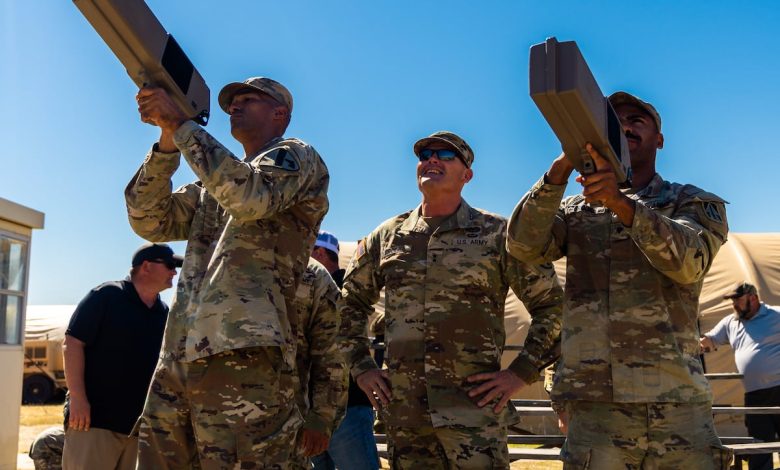Soldiers in Army basic training now knocking down drones

Brand-new recruits are now training how to counter enemy drones as they learn how to march and fire their rifles.
New soldiers at Fort Sill, Oklahoma, are conducting counter-drone drills during “The Forge,” the capstone field exercise in basic training, according to an Army release.
The post houses the service’s Fires Center of Excellence, Air Defense Artillery School and the Joint Counter small-Unmanned Aerial Systems University.
The move mirrors wide-ranging efforts in all the military services to beat back the aerial threat by adding counter-drone training, manning and equipment to troops’ arsenal.
RELATED
The Forge, which has been part of Army basic training for several years, puts new soldiers through a three-day field training exercise that concludes with a 10-mile ruck march.
“What’s different this year is the inclusion of live [drone] assets, something these trainees will encounter in future conflicts,” said Capt. Malachi Leece, commander of Alpha Battery, 1st Battalion, 40th Field Artillery. “It improves their reaction time, and that could save lives in a real combat scenario.”
The live counter-drone scenarios inside of a larger field exercise give soldiers a more realistic experience beyond a classroom, simulator or range.
“Introducing counter-UAS and drone operations at the basic training level gives our Soldiers a taste of what they will face in the future,” said 1st Sgt. Daniel Campbell, with 434th Field Artillery. “Even for cadre members, gaining this experience makes us more effective when we return to our units.”
The Army announced in late 2023 that it would add such skills at entry-level training, Army Times reported.
“It’s going to become a basic soldier requirement to identify, report and in some cases react to the threat,” Sgt. Maj. Demetrius Johnson, senior enlisted advisor for the joint counter-small unmanned aerial systems office said in 2023. “It’s MOS [military occupational speciality] agnostic; it’s not specific to an air defender to be able to employ these handheld systems.”
To that end, Gen. Gary Brito, head of Training and Doctrine Command told Army Times recently that the service has revised training publications to include the offensive use of small drones and counter-drone practices into courses at the Maneuver Center of Excellence at Fort Moore, Georgia, which trains infantry and armor soldiers.
Maj. Gen. Scott Naumann, commander of 10th Mountain Division, highlighted the measures his soldiers are taking to bring down drones and how it must be a routine part of soldiering.
“Training [counter-drone] should be as routine as drawing our rifles, going to the range and honing our marksmanship skills,” Naumann said at the Maneuver Warfighter Conference at Fort Moore in September.
The division’s 2nd Brigade Combat Team experienced 170 one-way drone attacks during a nine-month deployment to U.S. Central Command that concluded in April, according to Naumann.
Some of the division’s soldiers had a little help with their counter-drone preparation. Two officers, 1st Lt. Samuel Strobel and 1st Lt. Mitchell Crowley, developed software called the Randomized Enemy Action Contact Trainer, or REACT, system, following their own CENTCOM deployment in 2022.
The REACT system “generates essentially combat information about an incoming drone or rocket attack that helps simulate battle drills for an operations center,” according to an Army release.
Users can adjust the application to change the type or frequency of attacks.
Todd South has written about crime, courts, government and the military for multiple publications since 2004 and was named a 2014 Pulitzer finalist for a co-written project on witness intimidation. Todd is a Marine veteran of the Iraq War.
Read the full article here







![KE Arms Shotgun Picatinny Stock Adapter [FIRST LOOK] KE Arms Shotgun Picatinny Stock Adapter [FIRST LOOK]](https://i0.wp.com/www.recoilweb.com/wp-content/uploads/2025/01/KE-Arms-Shotty-3.jpg?w=390&resize=390,220&ssl=1)